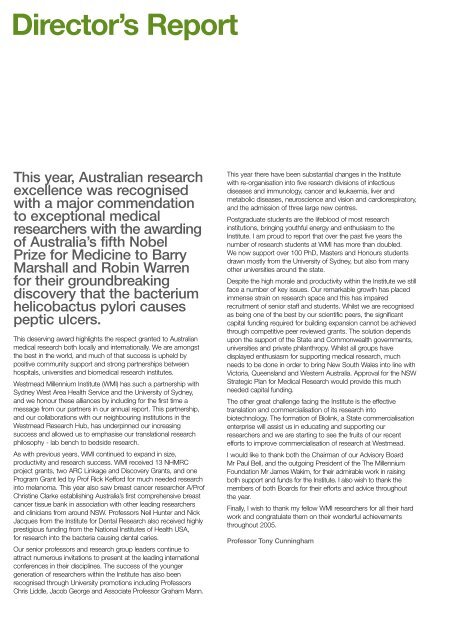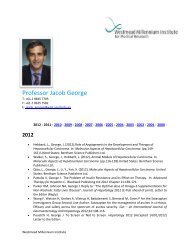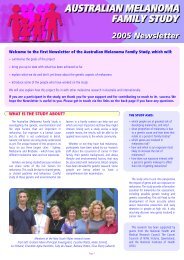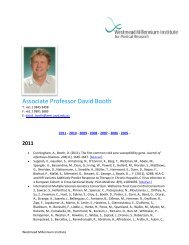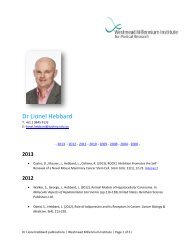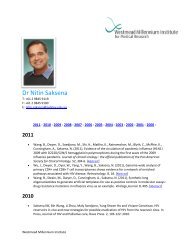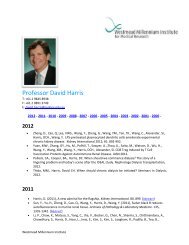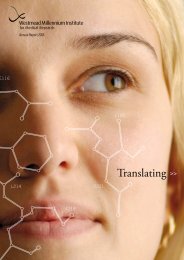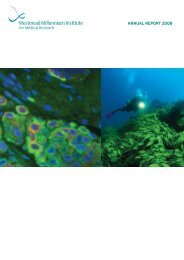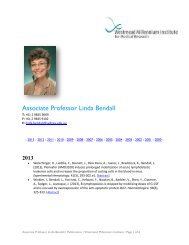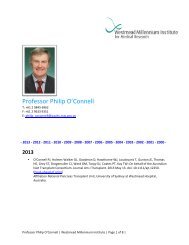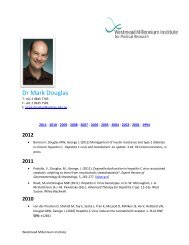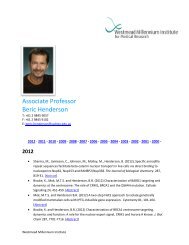Annual Report 2005 - Westmead Millennium Institute
Annual Report 2005 - Westmead Millennium Institute
Annual Report 2005 - Westmead Millennium Institute
You also want an ePaper? Increase the reach of your titles
YUMPU automatically turns print PDFs into web optimized ePapers that Google loves.
Director’s <strong>Report</strong><br />
This year, Australian research<br />
excellence was recognised<br />
with a major commendation<br />
to exceptional medical<br />
researchers with the awarding<br />
of Australia’s fifth Nobel<br />
Prize for Medicine to Barry<br />
Marshall and Robin Warren<br />
for their groundbreaking<br />
discovery that the bacterium<br />
helicobactus pylori causes<br />
peptic ulcers.<br />
This deserving award highlights the respect granted to Australian<br />
medical research both locally and internationally. We are amongst<br />
the best in the world, and much of that success is upheld by<br />
positive community support and strong partnerships between<br />
hospitals, universities and biomedical research institutes.<br />
<strong>Westmead</strong> <strong>Millennium</strong> <strong>Institute</strong> (WMI) has such a partnership with<br />
Sydney West Area Health Service and the University of Sydney,<br />
and we honour these alliances by including for the first time a<br />
message from our partners in our annual report. This partnership,<br />
and our collaborations with our neighbouring institutions in the<br />
<strong>Westmead</strong> Research Hub, has underpinned our increasing<br />
success and allowed us to emphasise our translational research<br />
philosophy - lab bench to bedside research.<br />
As with previous years, WMI continued to expand in size,<br />
productivity and research success. WMI received 13 NHMRC<br />
project grants, two ARC Linkage and Discovery Grants, and one<br />
Program Grant led by Prof Rick Kefford for much needed research<br />
into melanoma. This year also saw breast cancer researcher A/Prof<br />
Christine Clarke establishing Australia’s first comprehensive breast<br />
cancer tissue bank in association with other leading researchers<br />
and clinicians from around NSW. Professors Neil Hunter and Nick<br />
Jacques from the <strong>Institute</strong> for Dental Research also received highly<br />
prestigious funding from the National <strong>Institute</strong>s of Health USA,<br />
for research into the bacteria causing dental caries.<br />
Our senior professors and research group leaders continue to<br />
attract numerous invitations to present at the leading international<br />
conferences in their disciplines. The success of the younger<br />
generation of researchers within the <strong>Institute</strong> has also been<br />
recognised through University promotions including Professors<br />
Chris Liddle, Jacob George and Associate Professor Graham Mann.<br />
This year there have been substantial changes in the <strong>Institute</strong><br />
with re-organisation into five research divisions of infectious<br />
diseases and immunology, cancer and leukaemia, liver and<br />
metabolic diseases, neuroscience and vision and cardiorespiratory,<br />
and the admission of three large new centres.<br />
Postgraduate students are the lifeblood of most research<br />
institutions, bringing youthful energy and enthusiasm to the<br />
<strong>Institute</strong>. I am proud to report that over the past five years the<br />
number of research students at WMI has more than doubled.<br />
We now support over 100 PhD, Masters and Honours students<br />
drawn mostly from the University of Sydney, but also from many<br />
other universities around the state.<br />
Despite the high morale and productivity within the <strong>Institute</strong> we still<br />
face a number of key issues. Our remarkable growth has placed<br />
immense strain on research space and this has impaired<br />
recruitment of senior staff and students. Whilst we are recognised<br />
as being one of the best by our scientific peers, the significant<br />
capital funding required for building expansion cannot be achieved<br />
through competitive peer reviewed grants. The solution depends<br />
upon the support of the State and Commonwealth governments,<br />
universities and private philanthropy. Whilst all groups have<br />
displayed enthusiasm for supporting medical research, much<br />
needs to be done in order to bring New South Wales into line with<br />
Victoria, Queensland and Western Australia. Approval for the NSW<br />
Strategic Plan for Medical Research would provide this much<br />
needed capital funding.<br />
The other great challenge facing the <strong>Institute</strong> is the effective<br />
translation and commercialisation of its research into<br />
biotechnology. The formation of Biolink, a State commercialisation<br />
enterprise will assist us in educating and supporting our<br />
researchers and we are starting to see the fruits of our recent<br />
efforts to improve commercialisation of research at <strong>Westmead</strong>.<br />
I would like to thank both the Chairman of our Advisory Board<br />
Mr Paul Bell, and the outgoing President of the The <strong>Millennium</strong><br />
Foundation Mr James Wakim, for their admirable work in raising<br />
both support and funds for the <strong>Institute</strong>. I also wish to thank the<br />
members of both Boards for their efforts and advice throughout<br />
the year.<br />
Finally, I wish to thank my fellow WMI researchers for all their hard<br />
work and congratulate them on their wonderful achievements<br />
throughout <strong>2005</strong>.<br />
Professor Tony Cunningham


